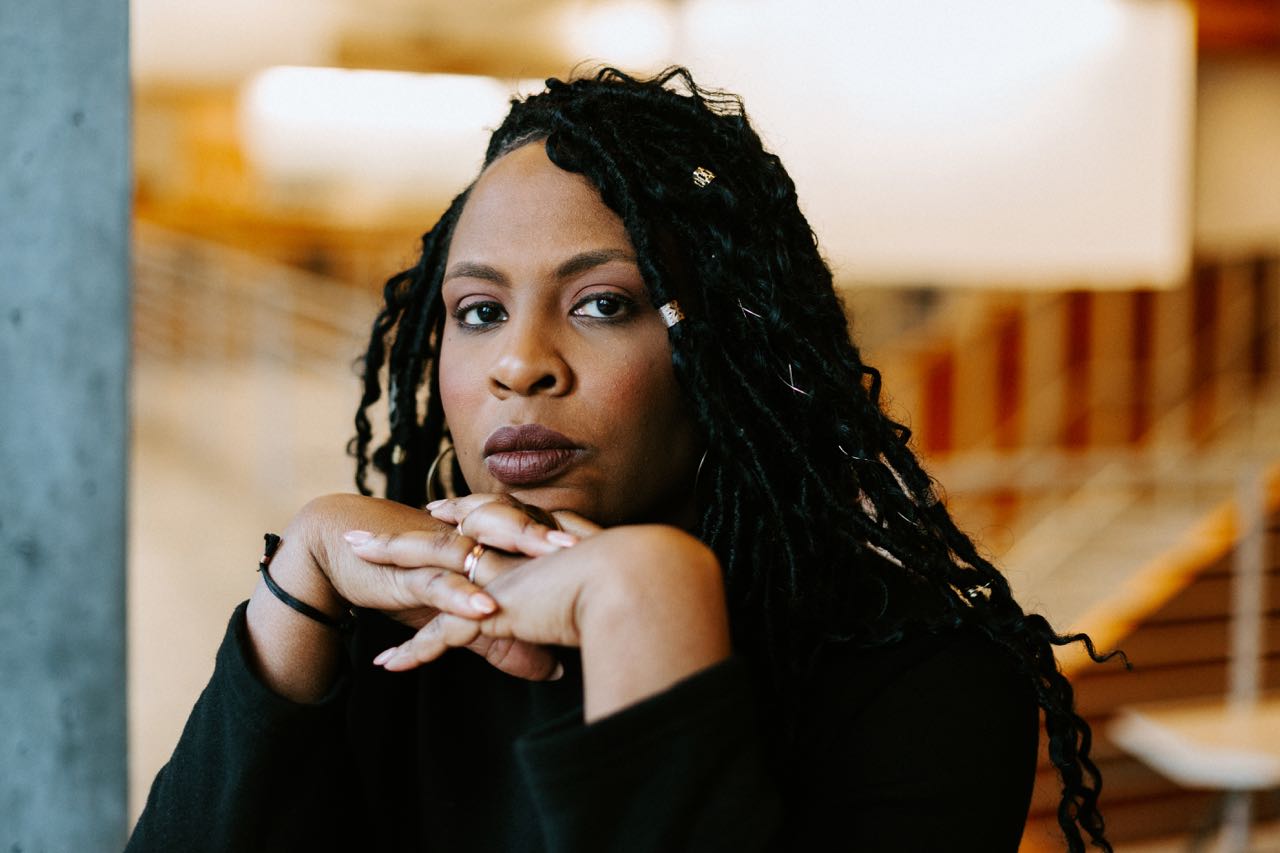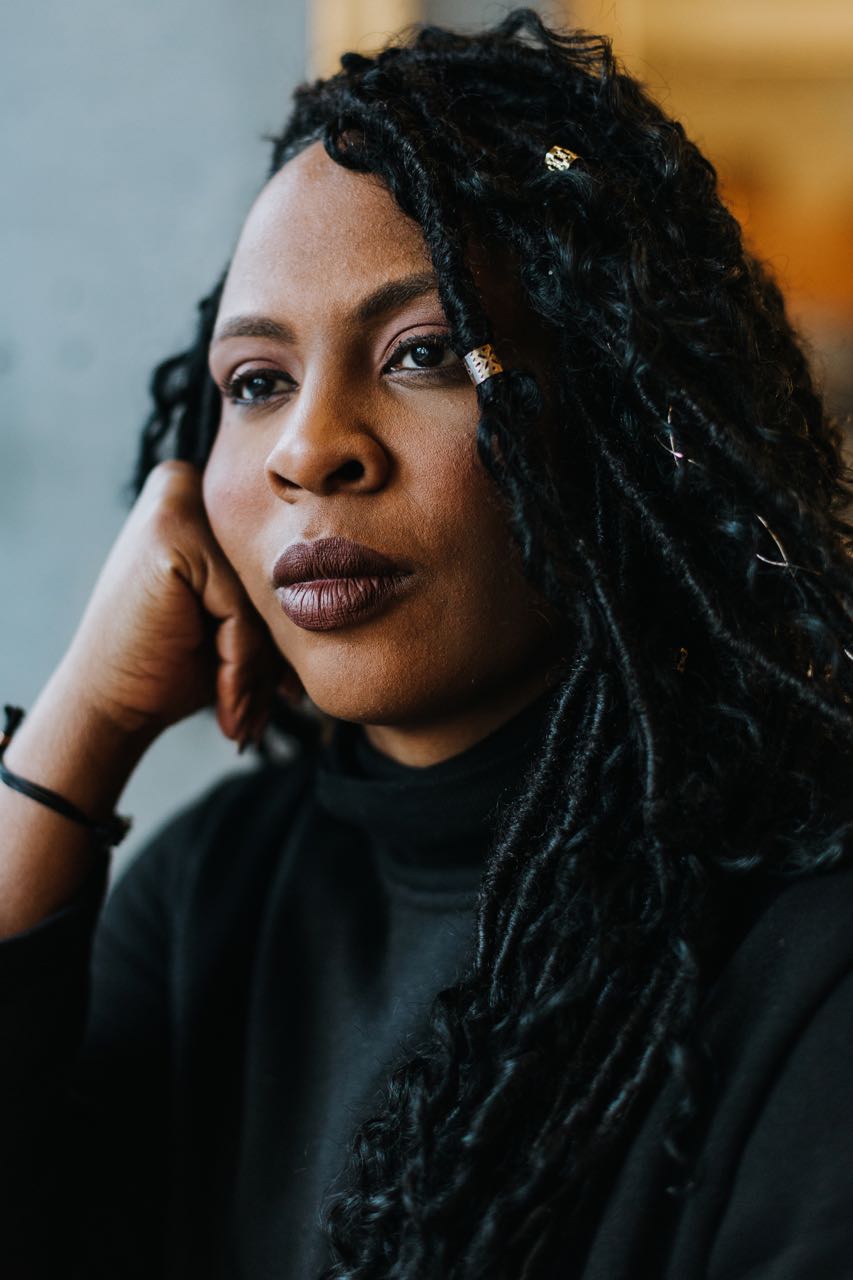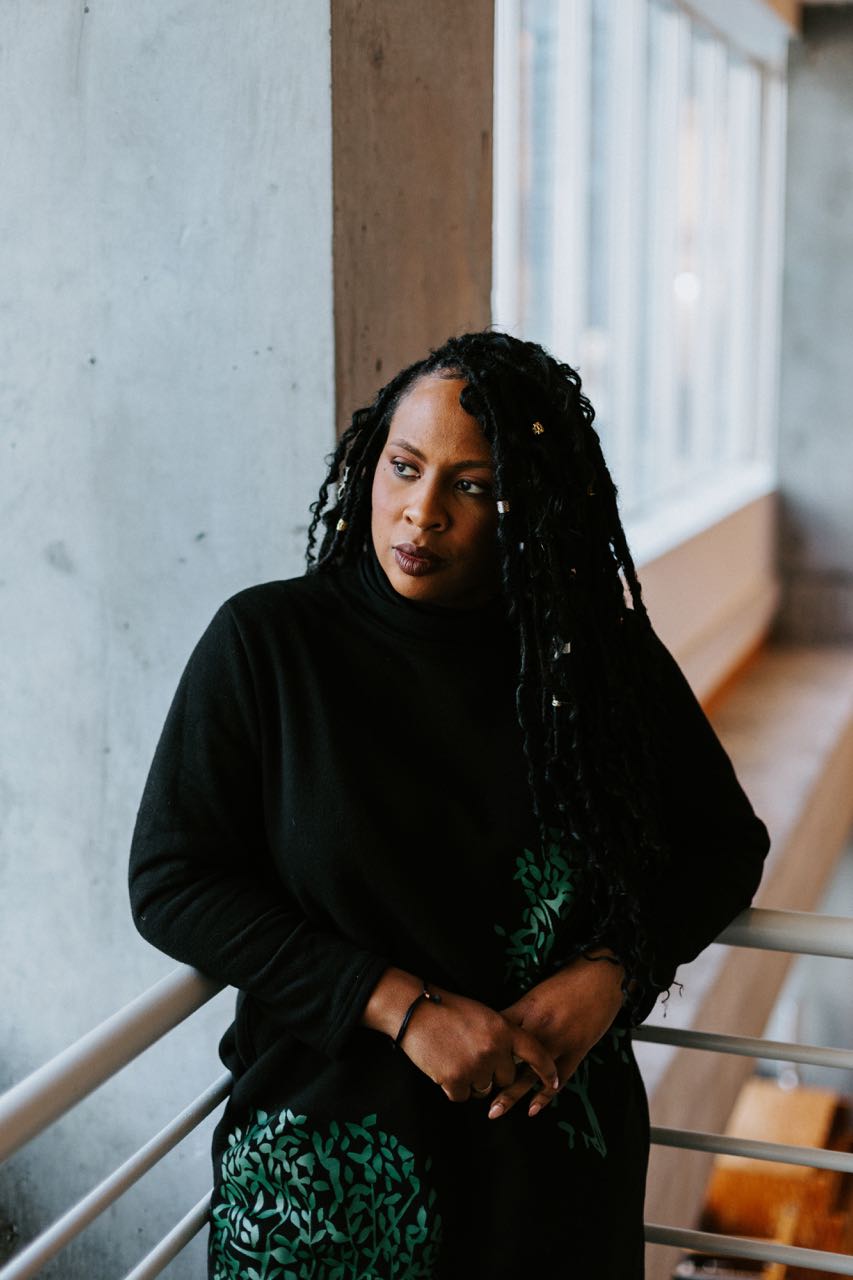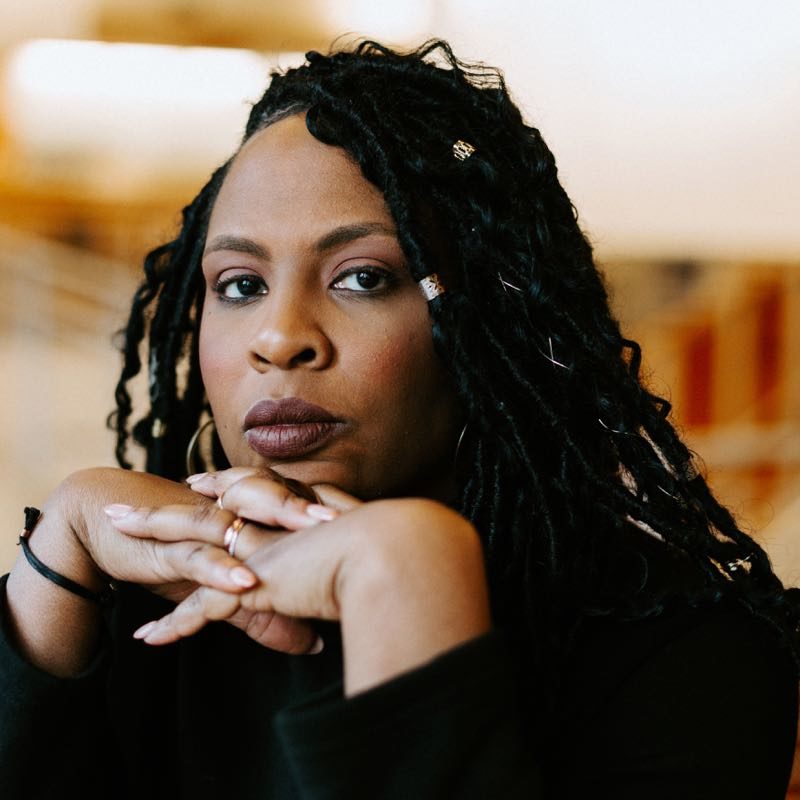Kamilah Forbes on By The Way, Meet Vera Stark and More

Written by Sarah Rebell
Photography by Tess Mayer
February 26th, 2019
Kamilah Forbes is currently making her Signature Theatre debut directing a revival of By the Way, Meet Vera Stark by Signature Playwright-in-Residence (and two-time Pulitzer Prize winner) Lynn Nottage. The play, which originally debuted at Second Stage in 2011, tells the story of a young woman of color trying to break into the film industry in 1930s Hollywood while working as a maid to a fading starlet. Or at least the first act tells that story. The second act uses various forms of media to analyze, question, and reexamine that narrative, providing a deconstructed look at who Vera Stark truly was.
A theatre and television producer, as well as director, Kamilah is also in the midst of her third season as Executive Producer of the historic Apollo Theater in Harlem. She has found that “both worlds influence one another,” meaning that her work as a producer informs her work directing plays such as Vera Stark. I recently spoke with Kamilah about her experience working on By The Way, Meet Vera Stark, her experience as a woman in a leadership position in the entertainment industry, and more.
In your career, you’ve been involved in several aspects of the entertainment industry. What was it that first drew you to the arts?
I’d say theatre and hip-hop, both for very different reasons. My parents used to take me to theatre when I was younger. I was little, and so I think it inspired me to believe. Belief of magic is what I’ve learned from theatre. And hip-hop was about voice. It was about voice and empowerment. That’s what drew me to that culture, that art form, and it’s always exciting when the two of them can come together.
And you produce as well as direct.
I do. I’m the Executive Producer at the Apollo Theater, so I produce a lot over there.
What is it like for you to be working as Executive Producer at the Apollo while simultaneously directing a play?
I think both worlds inform one another. At the Apollo, we are moving the organization into a space of creative innovation and generation, and not just as a presenter, but a commissioner of new works and multidisciplinary works. So, what’s interesting to me as we’re presenting more theatre at the Apollo is to be fully entranced and invested in the theatre community as we are moving more into that direction. Both worlds influence one another, right? I think my work as a director influences me as a producer, and vice versa, my work as a producer influences me heavily as a director by the choices that I make. For instance, as a director, I’m always very conscious of not just what’s happening in the box at the theatre, but what’s happening in the world of the whole space of a theatre. So, not just what’s happening on stage, but also what’s happening off. I’m very attuned to, from a producing perspective, how the play works based on who’s in the audience. Work resonates vastly differently in different spaces. What does the space look and feel like the second that you walk in the theatre? How do we curate our spaces? As a producer, I’m constantly [wondering], “How do I use performance tools to curate the space so that the building is activated with creativity the second you walk in? Whose is the first voice that greets you? How do they greet you? What does that feel like? How are you being prepared for this work of art that you are going to ultimately be greeted with?” Whether that’s what you see visually or what you hear sonically, the experience begins there, all the way to the end of the night. So, I’m very conscious of that in my work as a producer and as a director.
When I saw the show, I was very aware of the juxtaposition of going from the world of 1930s Hollywood in Act One to hearing Jay-Z during intermission. It felt like such an interesting and intentional choice.
Yes. I think the kind of conversation Lynn was trying to have was a very contemporary one. And I’m always asking myself, “Why this piece right now?” Especially with a period piece. I have to be able to bring contemporary relevance to it for me, as an artist. I need to know how this is speaking to my daily life. And I think to be able to use this contemporary music, particularly the Jay-Z “Hard Knock Life” coming right after this 1930’s screwball comedy moment, has helped to bridge those worlds. It reminds the audience that you can be caught up in this time period, but know that this is only to telegraph and to mirror what is ultimately the world in which we’re living today, the Hollywood today, and who’s controlling the narrative today.

Has working on Vera Stark altered your perspective at all about how the entertainment industry treats women, particularly women of color?
We had to do a great amount of research around this work. We were actually at quite a progressive period in Pre-Code Hollywood and then [learned about] how legislation could immediately shift culture so drastically. For me, that was really eye opening, because when I think about that time period, and Blacks in that time period, the only thing that’s emblazoned in my mind is the maid role, is being relegated to window dressing, or in the back, or to very stereotypical one-dimensional roles. That’s how we were seen, but to realize, “Oh, actually, there are laws that were instituted that prevented folks of color from having parts equal to their white counterparts in Hollywood, when that existed several years before with [pre-code] Baby Face,” that was tremendously eye opening to me. It really makes me think about the fragility of who controls the narrative. Who has power? Who has control? Ultimately legislation controlled culture, and influenced a wave of culture for several decades. We should be aware of that, of just how quickly we’re sitting on a teetering line.
That question of who controls the narrative seems to be extremely significant to this play, particularly the second act when a group of academics try to deconstruct their version of Vera Stark.
I think that’s what’s so fascinating about the second act, because 60, 70 years later, after this woman’s life, there’s still this debate of people still not wanting to give her agency, while arguing for her agency. That’s the irony, right? Working on this has only emboldened me even more, and emboldened my work as a producer even more, about stories by women of color, featuring women of color, featuring folks of color. How do we push those stories to the center, not just relegate them to the fringes? It’s an opportunity to be able to have a diversity of narrative, because that’s what the second act is arguing for. They’ve taken one narrative, and had to literally piece it apart almost like a kaleidoscope, because there was not a diversity of narratives presented that had their own self-interest reflected because black people are not homogenous. I think that’s what the work has done for me.
How do you approach directing a piece that asks such provocative questions about who this woman was and the choices that she made, without feeling compelled to judge her yourself?
With all of our characters in this world, it’s so easy to play my perception, an actor’s perception, or what we might perceive Lynn was going after for any of the characters, but the danger is then we start to step into caricature. So we’ve got to play the truth of this moment. We’ve got to find the truth of this woman, of all the women, of all the men, who are on this stage, to be able to ground them in reality and ground them in truth. In the room, we talked a lot about the idea, “What is the idea that she’s looking to discover?” Let’s all create a common language around that, but then we’ve got to drop down to the truth of these people.
Did you work with Lynn Nottage at all on revising the text?
We had a reading prior to the rehearsal process where Lynn wanted to hear the work again. She’d make little tweaks here and there. We did that early on, I think, in the fall.
Were aspects of this current production influenced at all by any of the cultural or political events that have occurred since the previous iteration of Vera Stark [which debuted in 2011]? Was there any conscious conversation about doing a revival of this play now, during the era of the Trump presidency?
Absolutely. I think what became so real is this idea that law from Washington can affect Hollywood. Sometimes we feel as though we are in a world in which whatever is happening in Washington is over there, and whatever is happening in entertainment and arts and culture is over here. But now, I think, we think quite differently. I might not have agreed with that ten years ago. I might have thought, “That happened in the 1930s; it’ll never happen again.” Now, I very much think it could. Also, we are in a wave of this immediate and necessary conversation around diversity in media, in theatres, in leadership in theatres and in media, in a way that felt very far away ten years ago. It definitely felt further away than I think it is now.
You founded the Hip-Hop Theater Festival back in 2000, so you’ve been wielding authority and agency in leadership positions long before the start of that conversation around diversity and leadership in theatre.
It’s interesting because of course it was a leadership role, and of course it was authority, but I don’t know if I looked at it that way. I looked at it as a necessity, because the company that we had founded, called Hip-Hop Theater Festival, was creating works for my generation by my generation. That was a necessity. Someone had to do it. That’s how I saw leadership at that time, and, quite frankly, that’s what leadership is, when you really think about it. Someone’s got to do it. Someone’s got to step up. Someone’s got to lead the way, be the advocate.
Do you feel fueled by those same motivations today when you’re directing a play?
I do feel fueled. I’m very interested in narratives that are underrepresented. I’m very interested in people and voices that sit on the fringes, and how to bring them to the center. I think that has been my world. I think being a child of a first generation American, and having a feeling of otherness as a person of color in this country, it’s always, “How do we bring these narratives to the center?” I think that’s always been what drives me.
Throughout your career, you’ve assisted Kenny Leon on Broadway plays, including Stick Fly, The Mountaintop and A Raisin in the Sun. What is the experience like of assisting another director in the storytelling process?
As a director, you don’t get a lot of opportunities to work with other directors. You’re the only one in the room. When I’ve been able to assist and work with Kenny, it was great because I actually got to observe and watch someone else work, and understand how he runs a room, how he collaborates with designers, and obviously assist him in that as well. Kenny is awesome. He’s very much in the room as a director, as a motivator with the cast, almost like a coach. He loves sports, so he’s like a coach in a lot of ways, and I think that’s important. I think sometimes we forget how important morale is for an ensemble, because they ultimately have to be a family for two, three, sometimes if it’s a commercial run, six, eight months. That’s so critical, because it’s human emotions that ultimately fuel the narrative storytelling. If you don’t put the work and leadership into developing and cultivating that congenial environment, that partnership, it could be detrimental to the work and the storytelling shows through.
You’ve also worked on quite a few shows written by women: Katori Hall, Lydia Diamond, Dominique Morisseau, and Lynn Nottage, of course. Do those collaborations have a different tone to them? Do those rehearsal rooms, with a female director and playwright, have a different vibe?
Yeah, I always think that. I do think that particularly on content that is also focused around a woman of color’s narrative at the core. As a director, I personally, naturally, will gravitate to the woman’s story. I remember when I was directing one of Dominique Morisseau’s plays, I felt the central story was the sister’s story, whereas the artistic director, who was a man, actually felt far more gravitated to the brother’s story. We had to argue it out a little bit, but that’s what was fascinating to me, as a director. As a director, you’re going to find who in the narrative of the story speaks to you, and what the lens is, what the gaze is that ultimately you are looking at this world through, and then, ultimately, inviting an audience to look at this world through, too.

The concepts of the “lens” and the “gaze” were such a part of the experience watching the many layers of performance, and performance media, in Vera Stark, where there is a black and white film shown throughout a colloquium, interspersed with a clip from a talk show, all within a live theatrical performance.
It’s fascinating, and I think the brilliance of Lynn Nottage is that she’s having this conversation of media with media, with all different forms of media, with theatre, with intellectualism, with academics, with film, and she also tricks you along the way. Every moment you think you’re watching a play about X, the rules that she sets up, she immediately breaks. You think the first act is this Antebellum play, and then all of a sudden, you realize that we’re rehearsing for a play, and you see, “Oh, this is clearly a black woman and a white woman.” Well, hmm, not really. Or is it? And then the second act comes, and there’s a film, which we think is a film, but is only a film to service the colloquium. It’s exciting, it’s interesting, it’s unexpected.
What are the challenges of that for you, as a director, in terms of having to guide the cast, and also the audience, through all of those different shifts and changes?
They are drastic shifts and changes; they are unexpected. [You have to] be unafraid to lead into the unexpectedness of it all. The tendency is, “How do I make this journey as easy and as smooth as possible?” But I had to come to terms with the fact that that wasn’t Lynn’s intent. The intent is to say, actually, “Nope, gotcha! It’s something else!” It keeps you on your toes, which, quite frankly, is what the media does all the time. We think it’s one thing, when actually, it’s something else. She’s built that conceit into the structure of the play, which I think is brilliant, and so you’ve got to lean into it.
I don’t want to give too much away, but there’s a big secret that has to do with the core identities and relationships of the two women at the center of the play that is alluded to throughout, but only confirmed in the final moments. When a show has a big reveal at the end, what do you do to avoid telegraphing the secret to the audience?
I think we always have to calibrate where we’re going and where we’re ultimately ending up. How do I lay enough breadcrumbs to lead the audience along? Once we’re able to see what we’ve got as a whole, there might be moments where we need to pull back, because it might be too much. We’ve got to calibrate a lot of the journey in order to service the whole storytelling arc. But at the same time, you want to be able to drop enough of, “Oh, wait, is that what I heard? Interesting!” to keep an audience engaged.
We’ve been talking a lot about your process and your approach to directing here. Do you have any more general advice for young women who might aspire to direct or to produce?
Yes, the one piece of advice is just to do it. If you feel as though there’s a need, I can guarantee you that there are other people who may be feeling the same thing, but may not have the courage or the craziness to put themselves completely out there and build it. So, if you have that inclination, build, build, build. That’s from the producing perspective. As a director, believe in your vision, that you have something to say. I think directors, just as much as writers, have something to say. Be bold. Be direct. Be fearless.

